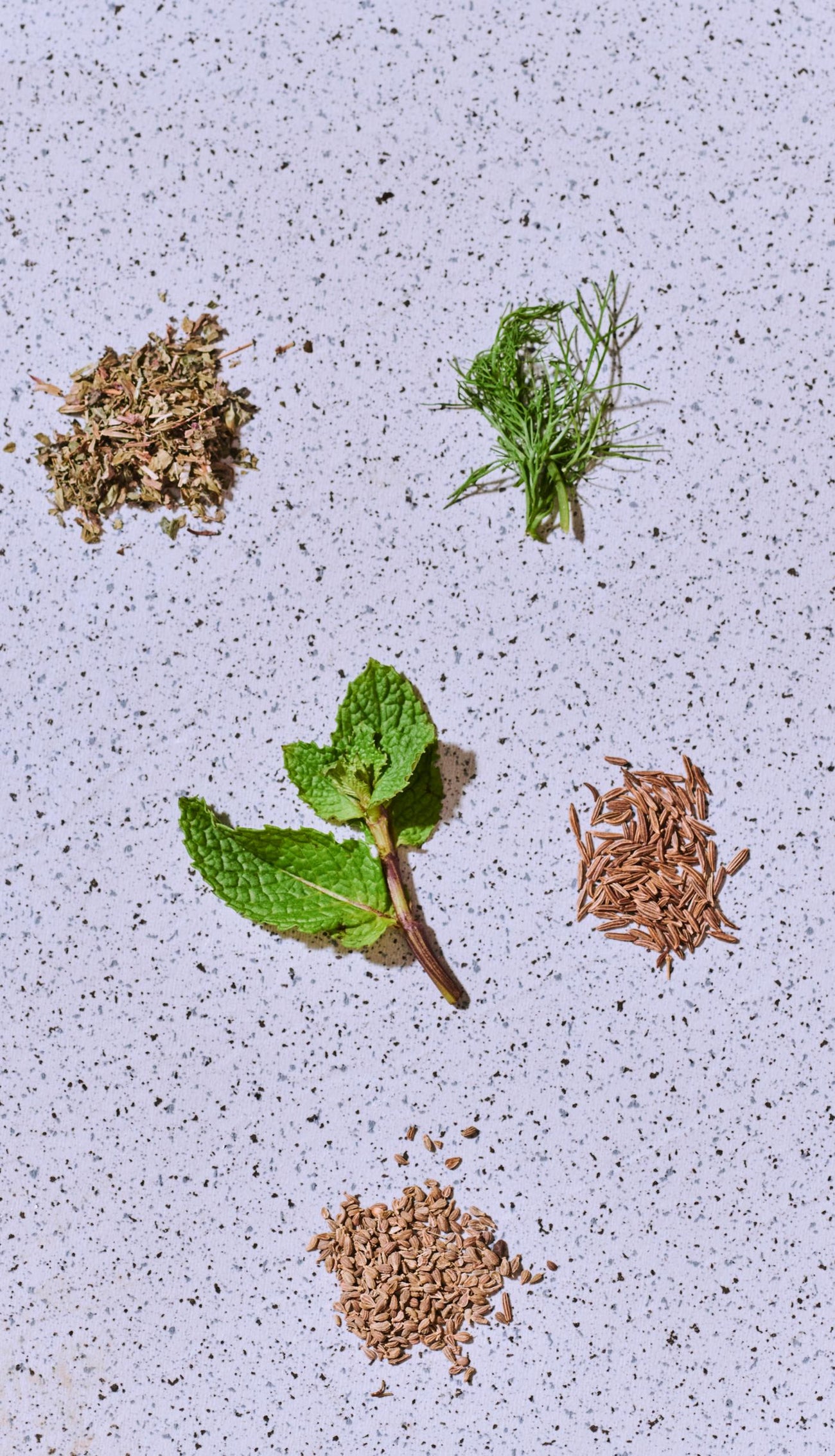
Gas is natural, but that doesn’t mean you have to just grin and bear it. Though there are plenty of remedy options on the pharmacy shelves (let’s not even talk about chewing gum), they’re often packed with ingredients that are unnecessary or harmful — the opposite of what you want when your gut is already feeling off. (That’s why we made Hilma Gas Relief with just five natural ingredients.)
So, what else can you do when you’re bloated and gassy besides blame the dog? In this article, we'll uncover 12 home remedies that could help you soothe that troublesome tummy and take back control from excessive gas and bloating.
But First, What Causes Gas and Bloating Anyway?
Understanding the root causes of gas and bloating is key to managing them effectively. Typically, gas forms in the digestive tract when undigested food gets broken down or when you swallow air.
There are several triggers:
- Eating too quickly can cause you to swallow too much air, leading to abdominal bloating.
- Legumes and cruciferous vegetables like broccoli and cabbage are notorious for causing gas symptoms due to their high fiber content. However, fiber is pretty important for digestive health, so don't skip these entirely — moderation is key!
- Dairy products can also lead to gas, especially for those with lactose intolerance. Using products like our Dairy & Gluten Aid can help by breaking down lactose.
- Artificial sweeteners like sorbitol can cause gas and bloating in some people.
- Various medical conditions such as irritable bowel syndrome (IBS), Crohn’s disease, and ulcers can cause significant bloating and gas. It's important to consult a healthcare provider if you suspect a medical condition.
What Does Gas and Bloating Feel Like?
When it comes to gas and bloating, the symptoms can be both unmistakable and a bit disruptive.
Here's what you might experience:
- Swollen Abdomen: A visible increase in the size of your belly, often referred to as feeling “puffed up.”
- Abdominal Pain: Sharp pains or cramps can occur anywhere in your stomach or intestines.
- Discomfort: A general sense of discomfort or pressure that feels like you've eaten too much.
- Excessive Gas: Frequent passing of gas, either through belching or flatulence.
- Noise: Gurgling or rumbling sounds in your stomach, known as borborygmi.
- Hard Stomach: Your belly may feel hard to the touch due to the pressure from the trapped gas.
It's important to remember that everyone's experience with gas and bloating can vary. If you’re unsure whether your symptoms are normal, please consult a healthcare professional.
What Can You Do To Naturally Alleviate Gas and Bloating?
When your stomach feels like it’s about to burst or every meal seems to turn into an impromptu gas orchestra, it's natural to seek relief. Luckily, there are several ways to reduce gas and bloating without resorting to over-the-counter medications.
Here’s a roundup of 12 effective natural remedies to help you feel lighter and more comfortable:
1. Increase Your Water Intake
Sometimes, the simplest solutions are the most effective. Drinking a glass of water can help to move things along in your digestive tract and ease bloating. Make it a habit to sip on water throughout the day, not just when you feel gassy.
2. Try Peppermint
Peppermint isn’t just for freshening breath — it’s also excellent for soothing the digestive system. Peppermint tea can relax the intestinal muscles, allowing gas to pass more easily and reducing bloating. Plus, it’s a pleasant, calming beverage to enjoy daily.
3. Exercise Regularly
Physical activity helps stimulate the passage of gas through your digestive tract. Whether it’s a brisk walk, a yoga session, or light stretching, regular movement is beneficial. Yoga poses like the wind-relieving pose can be particularly helpful in easing digestive discomfort.
4. Incorporate Ginger Into Your Diet
Ginger has been used as a natural remedy for various gastrointestinal issues for centuries. Consuming a small piece of ginger or sipping on ginger tea can help reduce inflammation and promote the digestion of heavy meals.
5. Evaluate Your Diet
Monitor how different foods impact your digestion. High-fiber foods like legumes and cruciferous vegetables can cause gas, but as touched on earlier, they're vital for health. Introduce them gradually to your diet to allow your digestive system to adjust smoothly.
6. Try Charcoal
For those days when you feel unusually bloated and gassy, activated charcoal can come to the rescue. It's known to absorb excess gas in your digestive tract, helping to relieve discomfort. However, it's wise to use this remedy selectively and with medical advice, as charcoal can interact with medications and absorb nutrients.
7. Opt for Smaller, More Frequent Meals
Eating large meals can put a strain on your digestive system, leading to increased intestinal gas and bloating. Try eating smaller portions more frequently throughout the day to keep your digestive system running smoothly.
8. Embrace Probiotics
Probiotics are beneficial bacteria that play an essential role in maintaining gut health. Regularly consuming probiotics can help balance your gut flora, which in turn can reduce gas and bloating. Our Daily Pre + Probiotic + Herbs is a great way to incorporate these beneficial bacteria along with gut-soothing herbs into your daily routine.
9. Slow Down and Chew Your Food
Taking time to chew your food thoroughly can make a significant difference in your digestion. Chewing breaks down food and reduces the amount of air you swallow with your food, which can help prevent bloating and gas.
10. Utilize Fennel and Anise
Both fennel and anise are renowned for their carminative properties, which help to prevent the buildup of gas in the gastrointestinal tract. Chewing on a few fennel seeds after a meal or sipping on a cup of anise tea just might be what you need to aid in digestion and alleviate gas pain.
11. Consider Taking Digestive Enzymes
If you find certain foods consistently give you trouble, digestive enzymes may help. For example, if dairy products cause bloating, taking a lactaseenzyme can aid in breaking down lactose. Our Dairy + Gluten Digestive Enzymes are formulated to help you enjoy these foods without the usual discomfort.
12. Apple Cider Vinegar
A tablespoon of apple cider vinegar in a glass of water before meals can help stimulate digestive juices and support healthy digestion. This remedy is especially handy if you’re dealing with reflux or heartburn because it can help balance your stomach's pH levels.
When Should You Consider Medical Advice for Gas and Bloating?
Even with all these natural tricks up your sleeve, sometimes it's best to seek professional advice.
Here's when to pick up the phone:
- Persistent Symptoms: If you're consistently experiencing gas and bloating despite making dietary and lifestyle changes.
- Severe Pain: If your stomach pain intensifies or doesn't go away, it could indicate a deeper issue.
- Additional Worrisome Symptoms: Including unexpected weight loss, constipation, or signs of reflux that disrupt your daily life.
Remember, gastroenterology experts are there to help you navigate through more serious digestive problems.
Here at Hilma, we believe in tackling health hiccups with nature's own wisdom. Gas and bloating don't have to be your daily norm, and with the right approach, you can enjoy every meal without worry.
Our natural remedies are designed to support your digestive health effortlessly. So, the next time your belly feels a bit off, remember these tips, reach for a remedy like our Gas + Bloat Relief* and keep your digestion on a happy, healthy track.
Cheers to less bloating and more doing what you love!
Sources:
Dietary fiber: Essential for a healthy diet | Mayo Clinic
Lactose intolerance - Symptoms & causes | Mayo Clinic
Water after meals: Does it disturb digestion? | Mayo Clinic
Peppermint oil: a medicine to treat to treat stomach cramps and bloating | NHS



